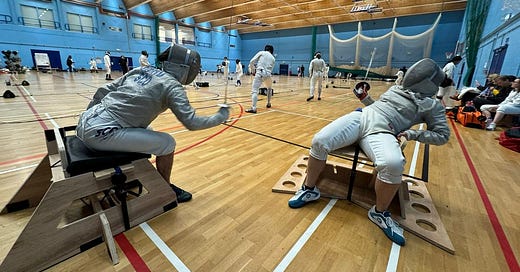En guard! If you're in a wheelchair, make a seat
The designers of the low-cost SwordSeat hope it will encourage greater participation in wheelchair fencing
FENCERS with a disability can take a seat.
The seat in question is designed to make the sport of fencing more accessible to people who use a wheelchair.
It's not just about modifying the chair –rigs already exist that do that – but drastically reducing the cost so that more can people afford to take up the sword.
The so-called SwordSeat was commissioned by British Fencing, which worked in collaboration with engineers at the University of Bath, to come up with a simple and low cost wooden frame.
Essentially, the SwordSeat is a pair of chairs that correctly position competitors for combat. The crucial point is that these rigs can be built using minimal tools and materials. The six-piece slot-together design means it can be constructed by local clubs, or potential participants of the sport, for around £150 worth of plywood.
Only a handful of the UK’s 400-plus fencing clubs have wheelchair fencing rigs. These cost more than £5,000 and need to have wheelchairs attached, totalling over £15,000. Inevitably, this leaves aspiring competitors facing significant barriers to trying the sport – the SwordSeat is intended to change that.
“The SwordSeat is our response to the prohibitive cost and equipment requirements of wheelchair fencing,” said Dr Ed Elias, a senior lecturer in the university’s Department of Mechanical Engineering, who created the low-cost rig with his integrated design engineering student, Conor Roberts.
“What’s surprising to many is that wheelchair fencers don’t need to move their chair when fencing – instead they are fixed into position. By removing these complicated elements and simplifying our design to the essentials, we’ve created a seat that is cheap and easy to build but meets the needs of anyone hoping to start out in the sport.”
Game changer
British Paralympic fencers won a total of six medals at the 2024 Paralympic Games, continuing the country’s record as one of the sport’s top competitors. Like any sport, however, fencing thrives on new blood, so ensuring more people can participate is important for its future.
There's also a matter of fairness, too; why should people interested in taking up fencing be unnecessarily excluded by the high costs of gear?
“The SwordSeat is a game changer,” said Rick Rodgers, British Fencing's inclusion officer (disability), who initiated the project. “It’s really going to open up the grassroots and give us a much larger pool of participants to enjoy this incredible activity and potentially become future Paralympic athletes.
“Reducing the equipment cost by more than 90% makes it roughly the price of a fencing mask or jacket, something which clubs loan to new fencers. It’ll save participants who need to fence sitting down from spending thousands of pounds on a new wheelchair before they even know if they like the sport.”
Plans for the seat are available online at the British Fencing website. It was officially launched at an event held at Bath's Sports Training Village this month.
The SwordSeat is designed so that its six parts can be cut from a single piece of 25mm plywood board. The only tools required are a jigsaw (or handsaw) and 6mm drill.
Flat pack fencing
Once cut, the parts can be assembled in around one minute and strapped together with ratchet straps for vital rigidity, or taken apart and flat-packed for easy transport.
The seat also incorporates an alignment board that can be configured to accommodate any combination of right- or left-handed competitors.
The DIY nature of the design means that changing some elements is possible – such as increasing the height of seat backs to help users with spinal injuries, who may need additional support.
“The SwordSeat means British Fencing now has an end-to-end offer for people looking to try the sport, with support from the grassroots up to elite level,” Rodgers added.
“We hope to see a pair of SwordSeats not only in every club in the country, but also being used in schools and a range of places where getting access to the wheelchairs and equipment has until now been impossible due to the price tag.”
Elias is alumnus of Bath, and represented the university in fencing during his student days; he says the complexities of wheelchair fencing were apparent before he started the project.
“I’d come across wheelchair fencing during competitions and was always struck by how unnecessarily complex the equipment seemed and how difficult to set up it was,” he said.
“Standing fencing is a lot about your footwork as well as your swordsmanship, whereas wheelchair fencing is all about your swordsmanship. It’s a fantastic sport that we think more people would be involved in if the facilities can be accessed – we hope the SwordSeat makes that a reality.”
MC




